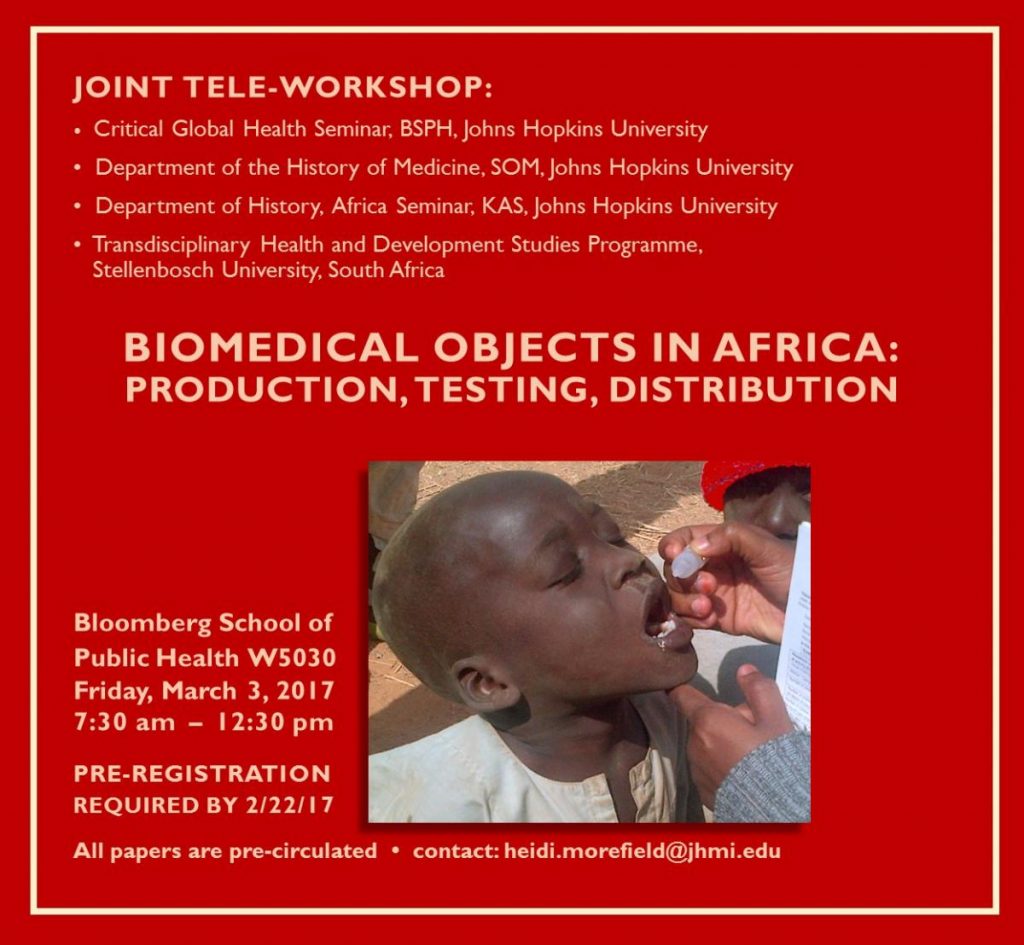March 3, 2017
12:00am
Biomedical Objects in Africa:
Production, Testing, and Distribution
Johns Hopkins School of Public Health, W5030
3/3/2017
7:30am-12:30pm
Global health interventions in the 21st century have become increasingly reliant on the use of biomedical objects—vaccines, artemisinin combination therapies, antiretroviral drugs, insecticide impregnated bednets, vitamin A capsules, and ready-to-use therapeutic foods like “plumpy-nut”—to improve the health of peoples living in resource-poor countries across the globe, and particularly in sub-Saharan Africa. At first glance, the use of these technologies has resulted from a linear process of development and production, testing in the field, followed by their adoption by global health institutions and distribution through networks involving manufacturers, donor organizations, and NGOs. Yet a closer examination of each stage of this pipeline reveals a more complicated narrative. This narrative raises multiple questions. Where are biomedical objects produced and who gets to produce them? How do biomedical objects move from being validated in local settings to being accepted as universally applicable technologies? How are decisions regarding the distribution of biomedical objects shaped by wider economic policies related to the role of markets versus public sector organizations in the provision of health care? How has the need to “market” interventions contributed to the reliance of global health organizations on the application of biomedical objects? What happens when biomedical objects become consumer goods? These and related questions will be explored in this workshop. The panels include researchers from the U.S., England, and South Africa who have studied global health from the perspectives of history, anthropology, sociology, medicine, public health, and sciences and technology studies.
Precirculated papers. Registration (by email only) is required to attend. Contact Heidi Morefield. ***REGISTRATION HAS BEEN EXTENDED UNTIL FEBRUARY 24th.***
Biomedical Objects in Africa: Production, Testing, and Distribution
A Joint Tele-Workshop with the Johns Hopkins Critical Global Health Seminar, the Johns Hopkins Africa Seminar, the Institute of the History of Medicine, and the Stellenbosch University Transdisciplinary Health and Development Studies Programme
Breakfast 7:30-8:00
Introduction: 8:00-8:15 Randall Packard, Johns Hopkins, Lindsey Reynolds, Stellenbosch University
Panel 1 (8:15am to 10:00am) What Makes a Biomedical Object?
Kirsten Moore-Sheeley, Johns Hopkins, Making Susceptible to research: The history of an insecticide-treated bednet trial in western Kenya.
Marissa Mika, University College London, Where There is No Incinerator: The Thin Line Between Disposability and Reuse of Protective Gear in African Health Work.
Thomas Cousins, Stellenbosch University and Michelle Pentecost, University of Cape Town, ‘Digestion, immunity and vitality’: nutriceuticals, ready-to-use-therapeutic foods, and the temporary as the Future.
.Discussants: Michael Degani, Johns Hopkins, and Anna Versfeld, University of Cape Town
Panel 2: (10:15 am to 12:00 pm) The Production, Testing and Distribution of Biomedical Objects
Nitsan Chorev, Brown University, Making Medicines in Kenya
Anne Pollock, Georgia Tech, Materializing Pharmaceutical Information in South Africa
Lindsey Reynolds, Stellenbosch University and Brown University, “Can Biomedical Objects be Universal? Testing, Adopting and Adapting ‘Universal test and treat’ for HIV Prevention in South Africa
Discussants: Reshma Ramachandran, Johns Hopkins; TBA
Sum Up Discussion: (12:00-12:30) Kris Peterson, University of California-Irvine
Working Lunch: 12:30 to 2:00 (limited to workshop panelists) at Institute of the History of Medicine: Round table on critical global health studies.
